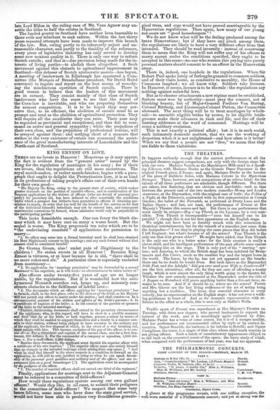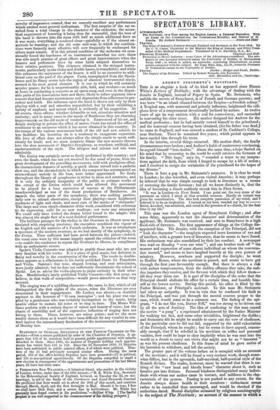THE PHILHARMONIC CONCERTS.
FIRST CONCERT OF THE SEASON—MON. DAT, REARM 16.
PAST I.
Sinfonia in B flat (No. 9) Haydn. Aria, " 0 caralmmfigine," Mr. Lockey, (.11F7auto Mattieo) Mozart. Concerto violin, M. sainton, (No. II in G) Spohr. Terzetto, "'IN prego, 0 madre Pia," Miss A. Williams,
Miss M. Williams, and Mr. Lockey Curschman.
Overture, Oberon C. M. von Wain
PAST IL
Binfonta Eroica Beethoven.
Duetto, " eat bomo," Miss A. Williams, and Miss M. Williams (Stabat Mater) ROSSinl. Overture, Les Deux Journhes Cherublni. Conductor, signor Costa.
A glance at this programme reveals, with one trifling exception, the well-worn material of a Philharmonic concert; and yet so strong was the
novelty of impression created, that we scarcely recollect any performance which excited more general enthusiasm. The first surprise of the ear re-
sulted from a total change in the character of the orchestra; the acous- tical experiment of lowering it being thus far successful, that the tone of the band is thrown into the room with half as much additional force as it was wont; everything is rendered clear—painfully so if the utmost ex- actitude be wanting; and the old seats mid-way, in which the combina- tions were formerly most effective, will now frequently be exchanged for others more remote. If in this altered condition of the orchestra we occa- sionally found the harshness of an instrument somewhat too new, there was also much promise of great effects and great improvements when the hearers and performers have by some habit adapted themselves to their relative positions. The clearness obtained in the stringed instru- ments, particularly in the violas and double basses, is remarkable; and while this enhances the enjoyment of the hearer, it will be an incentive to addi- tional care on the part of the player. Costa, transplanted from the Opera- house and its flimsy scores into the region of classical instrumental music, seemed in his most genial element. It is one in which he will certainly acquire praise; for he is unquestionably able, bold, and resolute—as much at home in conducting a concerto as an opera-song, and even in the disput- able parts of his innovations here and there, likely to infuse piquancy into a concert that had become monotonous and degenerate from adherence to pre- cedent and habit. His influence upon the band is shown not only by their playing with a zeal and attention unparalleled, but by their exhibiting a variety of emphasis and accent which is evidently of his suggestion. At all events, these effects, whether debatable or not, stimulate attention and curiosity; and in many cases in the music of Beethoven they are charming improvements on the old mode of rendering it. Enamoured of his art, and deeply studying in private the effect of scores, Costa has raised the office of conductor to an eminence which it has never obtained in this country. In the tempo of the various movements both of the old and new schools he was faultless: his besetting sin is a tendency to exaggerate expression. His love of effect does not always allow the simple music to speak suffi- ciently for itself; and we must certainly blame the new accents thrown into the slow movement of Haydn's Symphony, as overdone, artificial, and uncharacteristic of the style. The allegros and minuet and trio were admirable.
The Eroica was certainly never so finely performed in this country; and even the finale, which has not yet received its due meed of praise, from the great development of the preceding movements, told with prodigious effect. Its characteristic features of novelty, a quick theme turned into a pathetic slow one, and the elevated style in which the composer has accompanied an extraordinary melody in the bass, were better appretiated. No finale throughout the library of symphonies is richer in ideas and contrasts; and it is only the ordinary incapacity of the public to estimate works of the extent of the Eroica which could have allowed this movement to be played for a long succession of seasons at the Philharmonic unacknowledged as one of the finest productions of Beethoven. As regards the other parts of the symphony, there was nothing particu- larly new to attract observation, except finer playing—more heightened contrasts of light and shade, and more care of the marks of " sforzando." The large and even simple character of the work, considered with reference to its expression, calls for no new readings; nor were any attempted. We could only have wished the drums better tuned in the adagio: this was almost the single flaw of a most finished performance. The brilliant passages for the violins in the Overture to Oberon were ar- ticulated with surprising precision; the execution combined the vigour of an English and the neatness of a French orchestra. It was as triumphant 11. specimen of the modern overture, as we had shortly of the symphony, in the Eroica. Time sufficient had been saved between the pieces—indeed, the vocal ones were by this means happily spared the criticism of the room —to enable the conductor to repeat the Overture to Oberon, in compliance with an enthusiastic encore.
Spohr's Violin Concerto was adapted to gratify those most who are not very familiar with his works. It is a piece of good music, but deficient in fancy and novelty in the construction of the solos. The rondo in double- notes appears as a rifacimento in his lately published Duets for Pianoforte and Violin. Sainton's fine tone, elegant bowing, and neat articulation, were justly admired; but he does not sufficiently discriminate the school of Spohr. Let us advise the violin-players to pique curiosity in their selec- tion. Mendelssohn's lately published Violin Concerto—his first essay, we believe, in that walk of composition—would prove attractive on that very account.
The singing was of a middling character—the same, in fact, which of old distinguished the first nights of the season, when the Directors are ever economical in their engagements. Mr. Lockey was absent,—a doubtful aspirant to the honours of" 0 cars immagine "; and his place was sup- plied by a gentleman who was certainly incompetent to the music, being unable either to sustain his notes or to sing in tune. The Misses Wil- liams perform with a certain degree of talent and beauty of voice; but the charm of sensibility and of the expressive inflection of singing does not belong to them. These, however, are minor points; and we the more readily dismiss them as it would have been difficult for any vocalist to con- tend against the extraordinary fascination of the instrumental performance of Monday last.



























 Previous page
Previous page